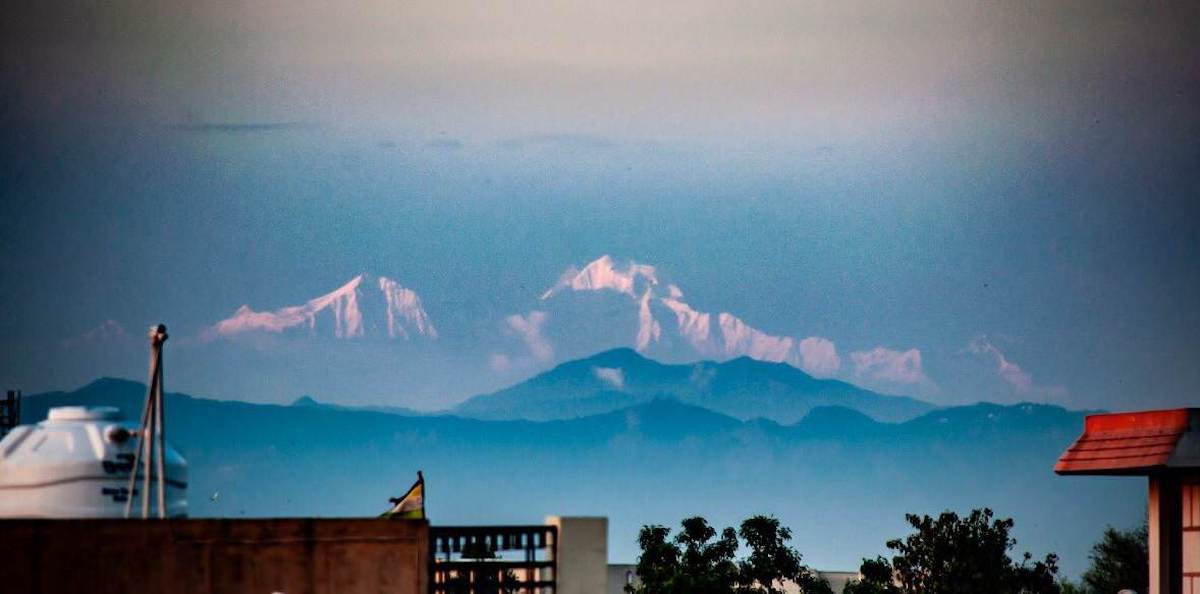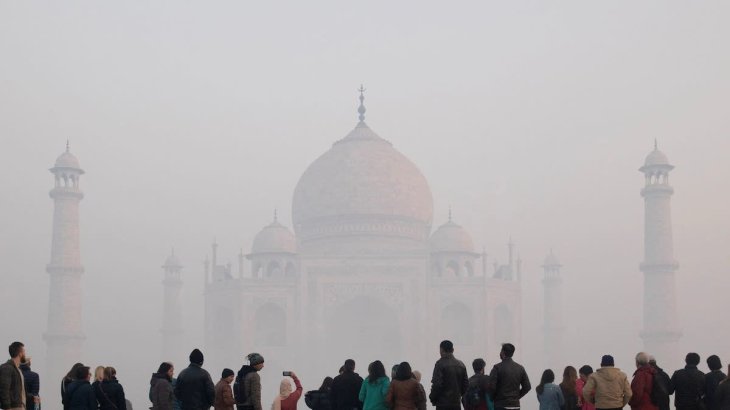Thanks To India Lockdown, Snow-Covered Gangotri Range Is Visible From Over 150Km Away
Harin - Apr 29, 2020

A Twitter user posted photos showing snow-covered peaks of Himalaya visible from Saharanpur, an Uttar Pradesh city, thanks to the India lockdown.
- This Over $100 Bottle Has Nothing But Fresh Air Inside
- Delhi Is The World’s Most Polluted Capital City For Three Years In A Row
- This Man's Super-Antibody Can Be Diluted 10,000 Times But Still Works Against COVID-19
With the India lockdown in effect, hitting pause on all industrial activities and traffic, there is a significant decrease in air pollution. The country has seen an improvement in terms of the Air Quality Index. And with the air being improved and the skies are clearer, we have been given the chance to witness the spectacular phenomenon.
It isn’t common for people living in Uttar Pradesh to wake up one day to the view of the Himalayan Range. But it did happen recently. Ramesh Pandey IFS shared on his Twitter pictures showing snow-covered peaks of Himalaya visible from Saharanpur, an Uttar Pradesh city. The pictures have soon become viral on the Internet.
The images were credited to Dushyant, an Income Tax inspector. When taking the photos, Dushyant was at his house in Vasant Vihar colony. The city where he lives is reportedly around 150 to 200 kilometers away from the Himalayan range. It is the Gangotri range that was captured in the pictures.
With the decline in air pollution levels, different mountain ranges have become visible from places that are far away.
Thanks to the nationwide lockdown, people living in Srinagar can see the Pir Panjal range. The photos are from journalist Waseem Andrabi.
A report points out that every year, many Indian cities’ alarming levels of air pollution are the result of aerosols from man-made sources. Aerosols are tiny liquid and solid particles that are trapped in the air. These particles reduce visibility as well as damaging the human heart and lungs.

Recent satellite images from NASA show that the Nothern India’s aerosol levels are at a 20-year low as all activities of human has been paused because of the COVID-19 pandemic.
>>> As The Air Becomes Clearer, The Pir Panjal Range Becomes Visible
Featured Stories

Features - Jan 29, 2026
Permanently Deleting Your Instagram Account: A Complete Step-by-Step Tutorial

Features - Jul 01, 2025
What Are The Fastest Passenger Vehicles Ever Created?

Features - Jun 25, 2025
Japan Hydrogen Breakthrough: Scientists Crack the Clean Energy Code with...

ICT News - Jun 25, 2025
AI Intimidation Tactics: CEOs Turn Flawed Technology Into Employee Fear Machine

Review - Jun 25, 2025
Windows 11 Problems: Is Microsoft's "Best" OS Actually Getting Worse?

Features - Jun 22, 2025
Telegram Founder Pavel Durov Plans to Split $14 Billion Fortune Among 106 Children

ICT News - Jun 22, 2025
Neuralink Telepathy Chip Enables Quadriplegic Rob Greiner to Control Games with...

Features - Jun 21, 2025
This Over $100 Bottle Has Nothing But Fresh Air Inside

Features - Jun 18, 2025
Best Mobile VPN Apps for Gaming 2025: Complete Guide

Features - Jun 18, 2025
A Math Formula Tells Us How Long Everything Will Live
Read more

Mobile- Feb 16, 2026
Xiaomi Launches Affordable Tracker to Compete with Apple's AirTag
For users tired of ecosystem lock-in or high prices, the Xiaomi Tag represents a compelling, no-frills option that delivers core functionality at a fraction of the cost.

ICT News- Feb 15, 2026
X Platform Poised to Introduce In-App Crypto and Stock Trading Soon
X has been laying the groundwork for this expansion.

Mobile- Feb 17, 2026
Anticipating the Samsung Galaxy S26 and S26+: Key Rumors and Specs
The Samsung Galaxy S26 series is on the horizon, sparking excitement among tech enthusiasts.
Comments
Sort by Newest | Popular